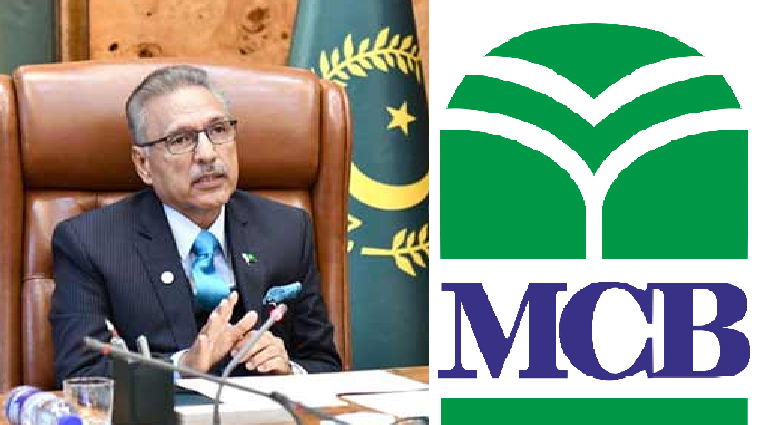President Alvi orders MCB to investigate corrupt officials involved in bank frauds
ISLAMABAD ( Web News )
President Dr Arif Alvi has directed the Muslim Commercial Bank (MCB) to investigate and initiate criminal proceedings, including the registration of FIRs, against corrupt bank officials of Gojra Road Branch, Jhang, who were involved in bank fraud. He also directed MCB to return Rs 3.093 million to a customer who had been swindled out of his money through the connivance of a Tea Boy and bank officials posted at the branch.
The President gave these directions while deciding upon a representation filed by MCB against the decision of the Banking Mohtasib directing the bank to pay the complainant a sum of Rs 3.093 million.
As per details, Muhammad Munir Ahmed etc. (Complainants) were maintaining a joint account at the MCB’s Gojra Road Branch, Jhang Saddar. They complained that upon reconciliation of the account in March 2021, they found a huge shortfall in their account balance and that 292 deposit slips totalling Rs.3,941,660/- were not credited to their account. They also held valid deposit slips duly signed and stamped by the bank officials for the deposits. They approached the bank for the redressal of their complaint but the Bank rejected their claim on the basis that a Tea Boy, posted at the branch, used to visit their laboratory for cash collection and the deposit slips were affixed with a “Utility Bills Received” stamp instead of “Cash Received” stamp. They further contended that the Tea Boy was employed by a third-party organization that had already lodged an FIR against him. The Bank stated that it was not responsible for the personal dealings of the customer with the Tea Boy which took place outside the Branch premises. Feeling aggrieved, they approached the Banking Mohtasib for redressal of their grievance.
The Banking Mohtasib accepted the complaint and directed the Bank to credit the Complainant’s account with a sum of PKR 3.093 million and report compliance within 40 days. Subsequently, the Bank filed a representation against the Mohtasib’s decision with the President.
The President conducted a personal hearing of the case at Aiwan-e-Sadr and rejected the Bank’s representation. In his decision, the President stated that the Bank’s denial of the claims of the Complainants on the ground that the deposit slip neither had the required “Cash Received” stamp nor was validated with any system entry was not tenable as the receipt was a bona fide document and admittedly issued under the signature of the Bank’s authorized Teller Services Officers (TSO) who had been penalized in terms of dismissal from Bank’s service. He further observed that the bank branch had violated the procedures by not complying with the Bank’s own SOPs, introducing on its own a new system of signing deposit slips, affixing the “Utility Bills Received” stamp (on customer copy only) without receiving cash as well as collecting cash from customers from their business places. This, he added, proved the Bank’s maladministration, malpractice, system failure and control weaknesses.
The President held that the Bank was vicariously liable for the acts of their employees’ conduct who were in active service of the Bank when the Complainants had become victims of fraud. “Shifting of liability on a Tea Boy is preposterous and carries no weight as he was admittedly, deputed by the branch to collect cash from customers’ business place and pre-signed and pre-stamped deposit slips were handed over to him by the branch and, as such, he was working as Bank’s agent and not as customer’s agent”, he said. He added that such fraud could not have been committed by a mere Tea Boy without the connivance of the corrupt bank officials by violating the defined procedure and in-vogue banking practices.
The President concluded that the Bank failed to fulfil its responsibility, breached the trust of the customers, and put them at a disadvantageous and risky position. He added that the appointment of vigilant, honest and professional bank officials/staff was the responsibility of the Bank and not of the Complainants, who had posed trust in the Bank.
“It is a case of wrongdoing and maladministration by the bank owing to their negligence. The Bank is responsible for making good the loss of the Complainants.”, held the President and rejected the Bank’s representation.

